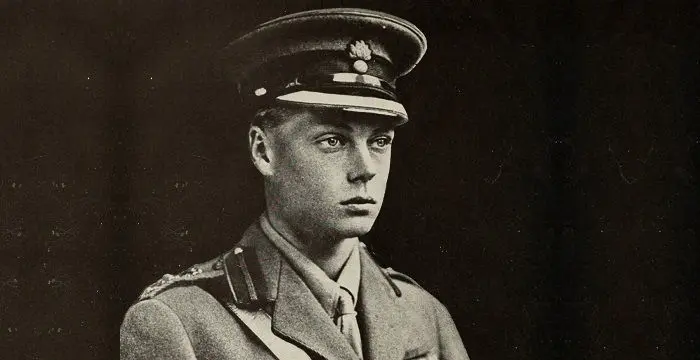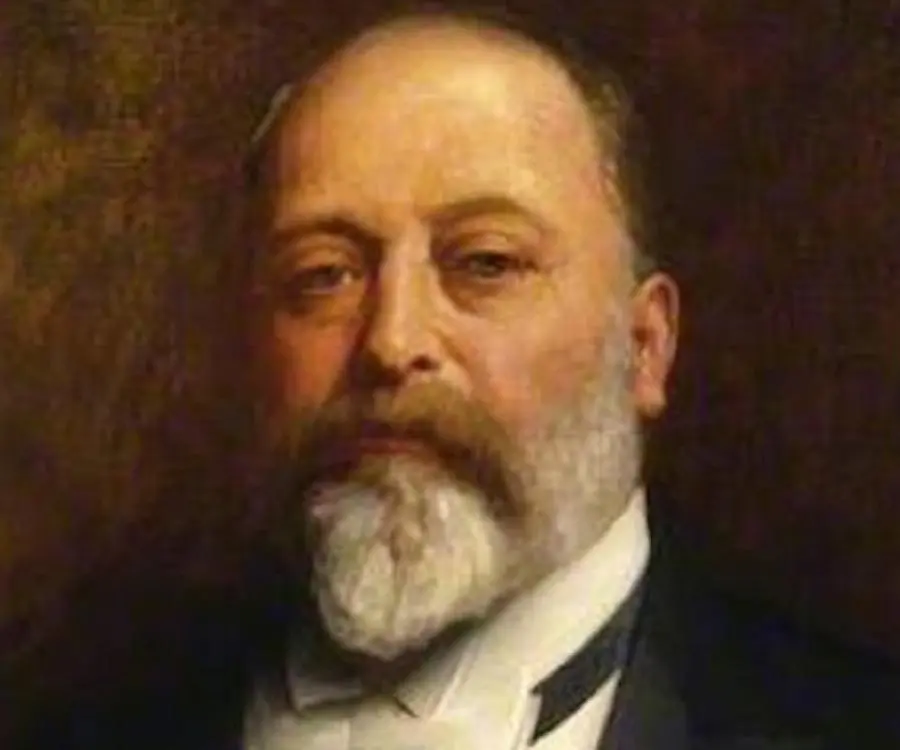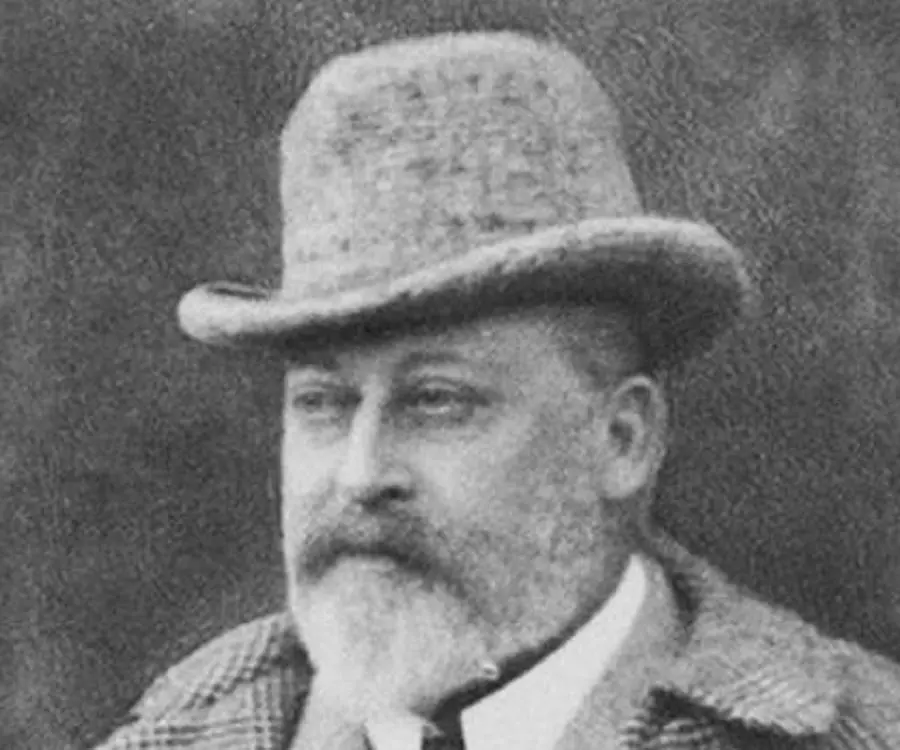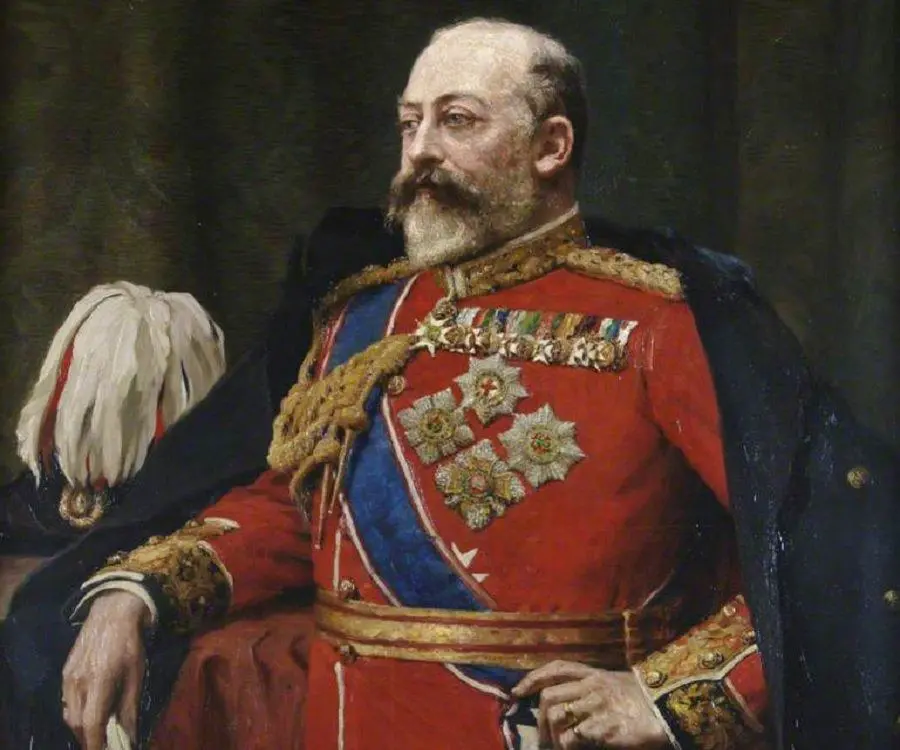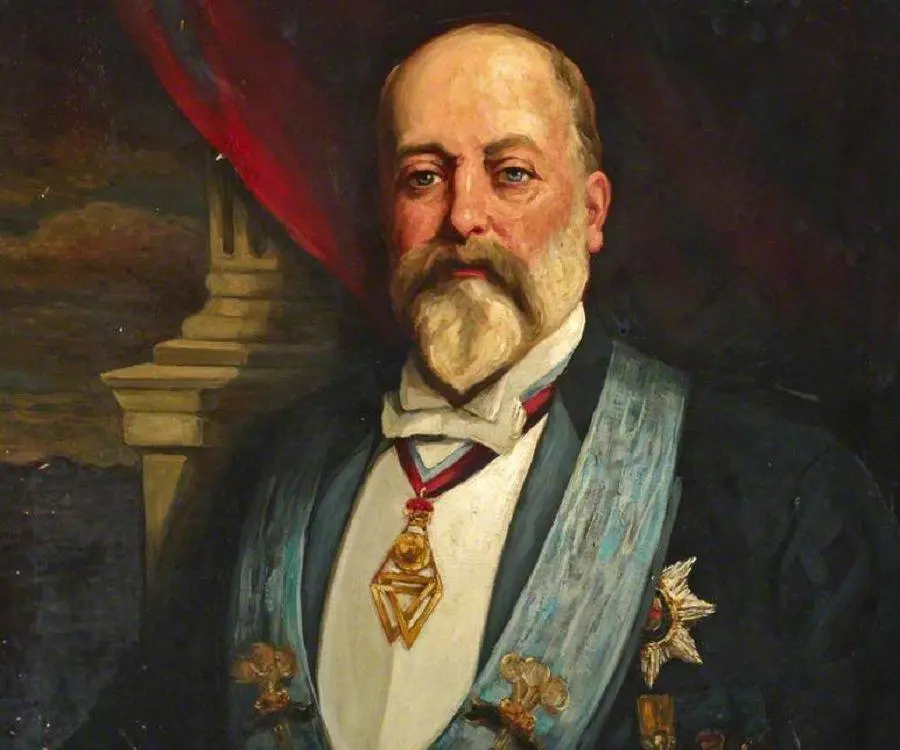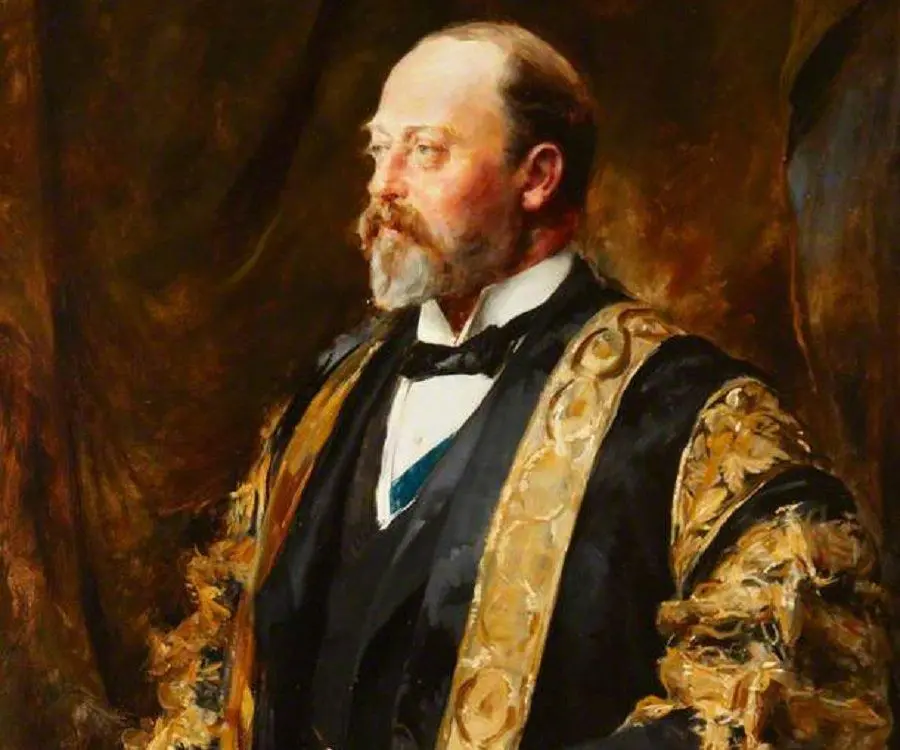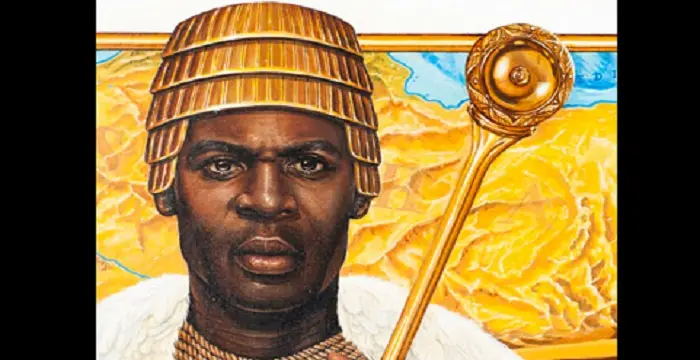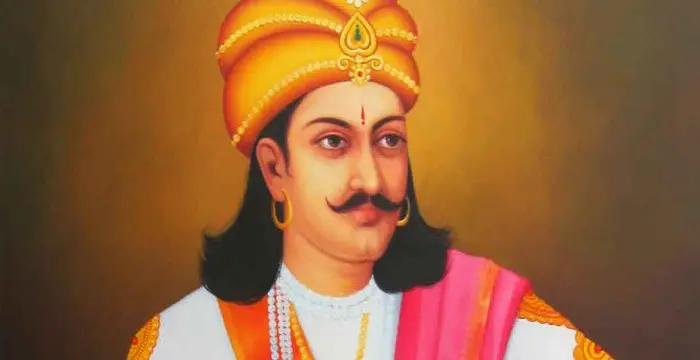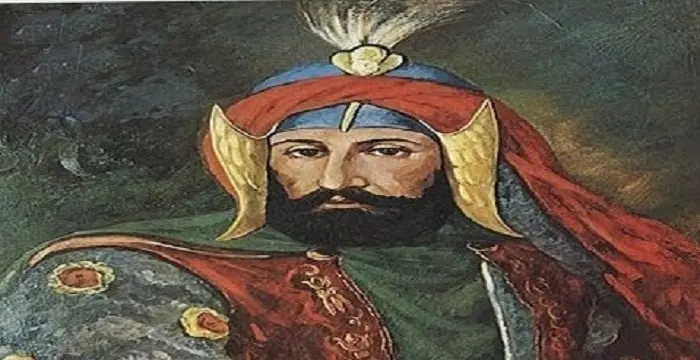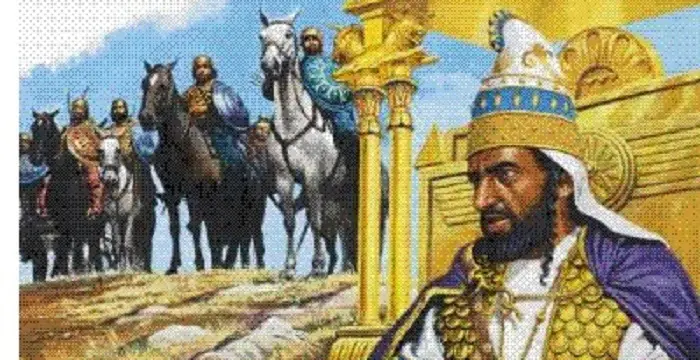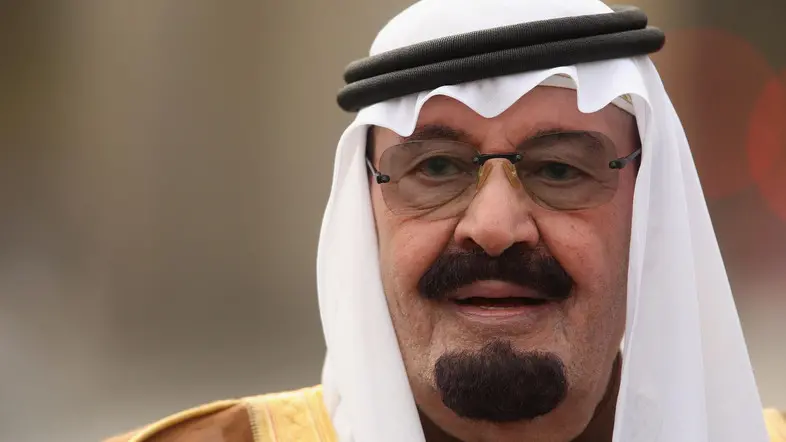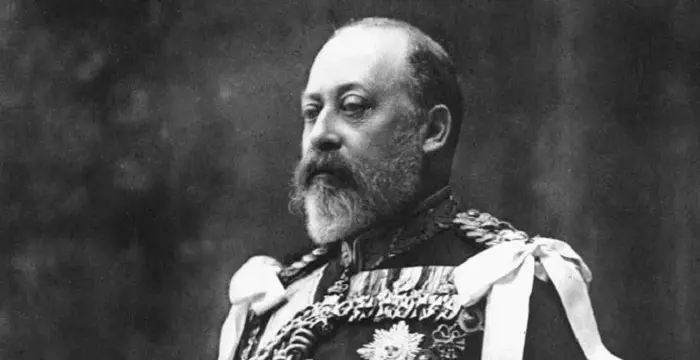
Edward VII - King of United Kingdom, Timeline and Life
Edward VII's Personal Details
Edward VII was the King of United Kingdom
| Information | Detail |
|---|---|
| Birthday | November 9, 1841 |
| Died on | May 6, 1910 |
| Nationality | British |
| Famous | Oxford University, Trinity College, Cambridge, Historical Personalities, Emperors & Kings, Emperors, King of United Kingdom, Kings |
| Spouses | Alexandra of Denmark |
| Siblings | Princess Alice of the United Kingdom, Princess Beatrice of the United Kingdom |
| Known as | Алберт Едвард фон Саксен-Кобург-Гота, Edvard VII, 爱德华七世 |
| Childrens | Duke of Clarence and Avondale, George V, Louise, Maud of Wales, Prince Albert Victor, Prince Alexander John of Wales, Princess Royal, Princess Victoria of the United Kingdom |
| Universities |
|
| Notable Alumnis |
|
| Founder / Co-Founder |
|
| Birth Place | Buckingham Palace |
| Religion | Protestantism |
| Gender | Male |
| Father | Albert, Prince Consort |
| Mother | Queen Victoria |
| Sun Sign | Scorpio |
| Born in | Buckingham Palace |
| Famous as | King of United Kingdom |
| Died at Age | 68 |
// Famous King of United Kingdom
Edward VIII of the United Kingdom
Edward VIII was the shortest reigning King of United Kingdom and the only British sovereign to voluntarily retire from the throne. Check out his biography to know more about his life, works and timeline
Edward VII's photo
Who is Edward VII?
Edward VII served as the King of United Kingdom, British Dominion and Emperor of India from 1901 to 1910. Eldest son of Queen Victoria and Prince Albert, Edward was the longest-serving heir apparent to the British throne before his accession in 1901. Furthermore, he holds the record for the longest serving holder of the title, Prince of Wales till date, closely followed by his great-great-grandson, Charles, current Prince of Wales. Edward jumped to fame even before his term of reign but due to wrong reasons. Highly self-indulgent, Edward was known as a womanizer and Casanova. His playboy reputation soured his relationship with his mother, Queen Victoria, who abstained him from pursuing any political duties during her term. As such, Edward in his early years mostly served as the British representative abroad. His tours, especially to that of North America and Indian subcontinent, were highly successful. During his short term of reign, Edward played an instrumental role in reforming the British Army and Navy. He also acted as the ‘peacemaker’ between England and France by fostering good relations between the two nations. Under his kingship, traditional ceremonies were largely publicized and royal socializing highly magnified. The only political hitch in his rule came in the form of constitutional crisis which was resolved posthumously. Edward VII was succeeded by his second son, King George V
// Famous Emperors
Sundiata Keita
Sundiata Keita was the founder of the Mali Empire in West Africa. This biography profiles his childhood, early life, struggles, founding of empire, rule, administration, achievements and also gives some fun facts.
Ashoka
Ashoka was the third emperor of the Mauryan Dynasty and ruled almost the entire Indian subcontinent. This biography profiles his childhood, life, reign, achievements and timeline
Murad IV
Murad IV was one of the mighty Sultans in the history of the Ottoman Empire. This biography profiles his childhood, family, accession, rule, administration and timeline.
Childhood & Early Life
King Edward VII was born as Albert Edward to Queen Victoria and Prince Albert of Saxe-Coburg and Gotha, on November 9, 1841 in Buckingham Palace. He was popularly known by his nickname Bertie.
Being the eldest son of the royal family, he automatically gained the titles, Duke of Cornwall and Duke of Rothesay. He succeeded his father as Prince of Saxe-Coburg and Gotha and Duke of Saxony. Other titles held by him include Prince of Wales, Earl of Chester, Earl of Dublin, Knight of the Garter and the Thistle.
Young Edward spent much of his early life meeting the unrealistic expectations of his parents for his ideal academic career. Following a rigorous educational routine, he matriculated from Christ Church, Oxford, in 1859.
Completing his preliminary education, he gained admission at Trinity College, Cambridge. It was at Cambridge that he enjoyed academic studies, excelling at Modern History taught by Charles Kingsley. Unlike his sister Victoria who was academically proficient, Edward was instead a charmer, with a friendly disposition.
Accession & Reign
Edward wanted to pursue a career in military but his mother vetoed the idea. Nevertheless, he joined the army and within a short period moved up the ladder to serve as the lieutenant colonel.
In 1861, Edward, despite being engaged to Princess Alexandra, was involved in a scandalous love affair with actress Nellie Clifton. Distraught by his playboy ways, his father passed away. Queen Victoria, who was deeply in remorse, blamed Edward for the death of his father.
Following the death of Prince Albert, Queen Victoria went into a perpetual state of mourning. She retreated herself from public life. Though Edward was allowed to represent her on state occasions, he wasn’t allowed to participate in the affairs of state.
With no political duties to carry, Edward became increasingly involved in wasteful activities. He became a leader of the London society and spent much of his time eating, drinking, gambling, shooting, racing and sailing.
In 1871, a brush with death improved his relations with the public as well as his mother, Queen Victoria. From the mid-1870s, Edward embarked on a tour to India. The tour was highly successful and upon his return, Queen Victoria received the title of Empress of India.
Following Queen Victoria’s death in 1901, Edward took over as the King of United Kingdom, Emperor of India and King of the British Dominions. He preferred to be called King Edward VII instead of King Albert Edward.
He was crowned in August 1902. Same year, he founded the Order of Merit, to reward people who made distinguished contribution in art and science.
With his effervescent attitude and friendly disposition, King Edward VII gave a new sense of energy and enthusiasm to the monarchy, which had been missing long since his father’s death in 1861. The once-gloomy dominion, upon his accession revelled with a new verve and spirit.
During his reign, King Edward’s main attention lay in foreign affairs, navy and military matters. His fluency in French and German helped him in his foreign trips where he secured much success.
He shuttled across Europe, meeting major heads of state and assisting in foreign policy negotiations. It was due to him that the Triple Entente Cordiale between Britain, France and Russia was signed in 1904. The entente marked an end to the Anglo-French rivalry and played a major role in World War I.
During his kingship, King Edward VII travelled widely. He was the first British reigning monarch to visit Russia and the first British monarch to visit Sweden.
Following the Boer War, King Edward involved himself with the reformation of the military. He not just redesigned the army command but also enforced the creation of Territorial Force. He also pressed for an army medical service and for the building of the modern Dreadnought battleships. A reformation of the Royal Navy was also suggested.
During the latter phase of his life, King Edward was involved in constitutional crisis. The People’s Budget presented by Liberal Prime Minister, H.H. Asquith was rejected by Conservative Lords. Eventually, class warfare broke out in the parliament which was finally resolved posthumously. A Parliament Act was passed which removed Lords power to veto bills and also reduced the term of the Parliament from seven to five years.
Major Works
During his reign, King Edward VII played an instrumental role in re-organizing the British Army and Navy following the Second Boer War. He redesigned the army command by creating a Territorial Force. He allowed for modernization of the British Home Fleet and suggested reformation of the Royal Navy as well.
King Edward VII was lauded as a ‘Peacemaker’, for helping foster good relations between Britain and France. His affable nature and friendly disposition helped Britain have good terms with other European nations as well.
Awards & Achievements
Before and after accession to the throne, Edward carried several titles including His Royal Highness The Duke of Cornwall and Rothesay, His Royal Highness The Prince of Wales, The Earl of Dublin, His Majesty The King and His Imperial Majesty The King-Emperor
He was bestowed with several British honors, including Knight of the Order of Garter, Knight Grand Cross of the Order of the Bath, Knight Grand Commander of the Order of the Star of India, Knight of the Order of the Thistle, Knight of the Order of St Patrick, Knight Grand Cross of the Order of St Michael and St George, Knight Grand Commander of the Order of the Indian Empire, Knight Grand Cross of the Royal Victorian Order and Great Master of the Order of the Bath.
He was made Fellow of the Royal Society and Member of the Privy Council of Ireland.
During his life, King Edward received VII a number of foreign honors as well. He was knighted by several countries including Spain, Portugal, France, Sweden, Prussia, Russia, Norway, Denmark and Ethopia.
Personal Life & Legacy
Edward first met Princess Alexandra of Denmark in Germany 1861. The two hit it off from the start and were eventually married at St George’s Chapel, Windsor Castle on March 10, 1863. They had six children.
Edward was a casanova. Despite being married to Princess Alexandra, he had a long list of mistresses which gained him the reputation of a playboy. Strangely, Princess Alexandra was aware of many of his affairs and accepted them. He is said to have been a regular visitor to Parisian brothels.
King Edward VII was heavily involved in smoking. He smoked about 20 cigarettes and 12 cigars per day. This persistent habit led to rodent cancer which was eventually treated in 1907. However, due to the bad habit, he suffered from bronchitis.
In 1909, he momentarily lost consciousness during a state visit in Berlin. Following year, he collapsed in Biarritz. On April 27, 1910 he returned to Buckingham Palace from Biarritz after a period of convalesce.
On May 6, King Edward VII suffered from multiple strokes which eventually took his life later at night. He worked till the very end of his life, refusing to succumb to ill health. He was buried at St George’s Chapel, Windsor Castle.
Trivia
This King of England was popularly known as the ‘Uncle of Europe’ as he was related to nearly every other European monarch at the time of his reign.
// Famous Kings
Sundiata Keita
Sundiata Keita was the founder of the Mali Empire in West Africa. This biography profiles his childhood, early life, struggles, founding of empire, rule, administration, achievements and also gives some fun facts.
Ashoka
Ashoka was the third emperor of the Mauryan Dynasty and ruled almost the entire Indian subcontinent. This biography profiles his childhood, life, reign, achievements and timeline
Murad IV
Murad IV was one of the mighty Sultans in the history of the Ottoman Empire. This biography profiles his childhood, family, accession, rule, administration and timeline.
Edward VII biography timelines
- // 9th Nov 1841King Edward VII was born as Albert Edward to Queen Victoria and Prince Albert of Saxe-Coburg and Gotha, on November 9, 1841 in Buckingham Palace. He was popularly known by his nickname Bertie.
- // 1859Young Edward spent much of his early life meeting the unrealistic expectations of his parents for his ideal academic career. Following a rigorous educational routine, he matriculated from Christ Church, Oxford, in 1859.
- // 1861In 1861, Edward, despite being engaged to Princess Alexandra, was involved in a scandalous love affair with actress Nellie Clifton. Distraught by his playboy ways, his father passed away. Queen Victoria, who was deeply in remorse, blamed Edward for the death of his father.
- // 1861With his effervescent attitude and friendly disposition, King Edward VII gave a new sense of energy and enthusiasm to the monarchy, which had been missing long since his father’s death in 1861. The once-gloomy dominion, upon his accession revelled with a new verve and spirit.
- // 1861 To 10th Mar 1863Edward first met Princess Alexandra of Denmark in Germany 1861. The two hit it off from the start and were eventually married at St George’s Chapel, Windsor Castle on March 10, 1863. They had six children.
- // 1871In 1871, a brush with death improved his relations with the public as well as his mother, Queen Victoria. From the mid-1870s, Edward embarked on a tour to India. The tour was highly successful and upon his return, Queen Victoria received the title of Empress of India.
- // 1901Following Queen Victoria’s death in 1901, Edward took over as the King of United Kingdom, Emperor of India and King of the British Dominions. He preferred to be called King Edward VII instead of King Albert Edward.
- // Aug 1902He was crowned in August 1902. Same year, he founded the Order of Merit, to reward people who made distinguished contribution in art and science.
- // 1904He shuttled across Europe, meeting major heads of state and assisting in foreign policy negotiations. It was due to him that the Triple Entente Cordiale between Britain, France and Russia was signed in 1904. The entente marked an end to the Anglo-French rivalry and played a major role in World War I.
- // 1907King Edward VII was heavily involved in smoking. He smoked about 20 cigarettes and 12 cigars per day. This persistent habit led to rodent cancer which was eventually treated in 1907. However, due to the bad habit, he suffered from bronchitis.
- // 1909 To 27th Apr 1910In 1909, he momentarily lost consciousness during a state visit in Berlin. Following year, he collapsed in Biarritz. On April 27, 1910 he returned to Buckingham Palace from Biarritz after a period of convalesce.
// Famous Emperors & Kings
Sundiata Keita
Sundiata Keita was the founder of the Mali Empire in West Africa. This biography profiles his childhood, early life, struggles, founding of empire, rule, administration, achievements and also gives some fun facts.
Ashoka
Ashoka was the third emperor of the Mauryan Dynasty and ruled almost the entire Indian subcontinent. This biography profiles his childhood, life, reign, achievements and timeline
Murad IV
Murad IV was one of the mighty Sultans in the history of the Ottoman Empire. This biography profiles his childhood, family, accession, rule, administration and timeline.
Xerxes I
Xerxes I (Xerxes the Great) was the fourth and the most famous king of the Archaemenid dynasty of Persia. This biography profiles his childhood, family, personal life, life history, achievements, campaigns, administration, death and other facts.
Sargon of Akkad
Sargon of Akkad, also called ‘Sargon the Great’, ‘Sarru-Kan’ and ‘Shar-Gani-Sharri’, was the founder and first king of the Akkadian Empire. This biography profiles his childhood, life, rule, administration, timeline, and gives some fun facts.
Abdullah of Saudi Arabia
Abdullah bin Abdulaziz Al Saud was the King of Saudi Arabia from 2005 to 2015 and the third wealthiest head of state in the world. Find more facts about his life, childhood and timeline.
Edward VII's FAQ
What is Edward VII birthday?
Edward VII was born at 1841-11-09
When was Edward VII died?
Edward VII was died at 1910-05-06
Where was Edward VII died?
Edward VII was died in Buckingham Palace
Which age was Edward VII died?
Edward VII was died at age 68
Where is Edward VII's birth place?
Edward VII was born in Buckingham Palace
What is Edward VII nationalities?
Edward VII's nationalities is British
Who is Edward VII spouses?
Edward VII's spouses is Alexandra of Denmark
Who is Edward VII siblings?
Edward VII's siblings is Princess Alice of the United Kingdom, Princess Beatrice of the United Kingdom
Who is Edward VII childrens?
Edward VII's childrens is Duke of Clarence and Avondale, George V, Louise, Maud of Wales, Prince Albert Victor, Prince Alexander John of Wales, Princess Royal, Princess Victoria of the United Kingdom
What was Edward VII universities?
Edward VII studied at Oxford University,Trinity College, Cambridge, Christ Church, Oxford, Trinity College, Cambridge
What was Edward VII notable alumnis?
Edward VII's notable alumnis is Oxford University, Trinity College, Cambridge
Which company or organization was founded by Edward VII?
Edward VII was the founder/co-founder of University of Leeds, University of Sheffield
What is Edward VII's religion?
Edward VII's religion is Protestantism
Who is Edward VII's father?
Edward VII's father is Albert, Prince Consort
Who is Edward VII's mother?
Edward VII's mother is Queen Victoria
What is Edward VII's sun sign?
Edward VII is Scorpio
How famous is Edward VII?
Edward VII is famouse as King of United Kingdom
